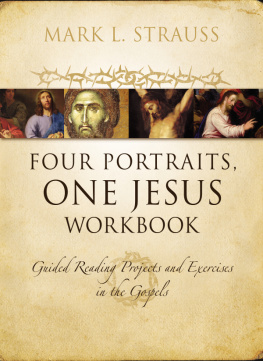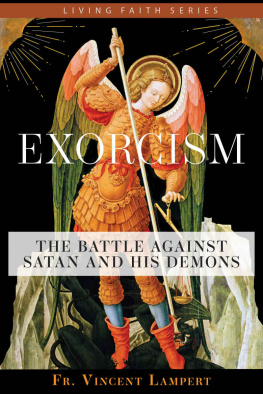Demonology
Sofia 2011
Copyright (c) 2011 Stephen H Hedges
All rights reserved. No part of this book may be reproduced, stored in retrieval system, or transmitted in any form or by any means electronic, mechanical, photocopy, recording, or any other except for brief quotations in printed reviews, without the permission of the author.
Requests for information should be addressed to:
Stephen H Hedges
s h h e d g e s @ h o t m a i l .c o m
(when using this email address remove the spaces)
Cover Design:
Deborah E Crittenden
d e c r i t t e n d e n @ h o t m a i l . c o m
(when using this email address remove the spaces)
Smashwords Edition
ISBN - 978-954-9941-54-8
Table of Contents
..
..
..
..
..
..
..s
:
The primary purpose of this book is to teach the average believer how to recognise and successfully expel demons, in him/herself and other believers. Therefore, it is necessary to first open the readers understanding to the teaching about demons from both the Hebrew Scriptures and the New Testament.
There are many popular misconceptions that some people have about the devil, demons, angels and other spirit-beings and each of these misconceptions must be corrected by looking only to the Scriptures.
It is most distressing to me when I hear Christians portray the devil as being a very powerful entity who is omniscient and omnipresent. If the devil has the ability to read our every thought, see everything that we do, and be everywhere at once, then he would be a real god. But the truth is that the devil is not a god, but simply a created being. Therefore, he cannot be everywhere nor have all knowledge, because he is not a god. So you dont really have to fear the devil.
The devil does exist, as do fallen angels and demons. They have a spiritual kingdom, but it is merely a counterfeit of the Kingdom of the Heavens.
This book will try to provide you with all the Biblical information that you need to recognise and expel demons. But for you to be successful in the deliverance ministry requires that you hear and follow the guidance of the Holy Spirit. This book, however, is not about your relationship to the Holy Spirit and assumes that you are already a Spirit-led believer.
:
Word Usage:
Throughout this book the term Hebrew Scriptures is used to replace the Christian term Old Testament. The most correct name for the Hebrew Scriptures is the TaNaK, The word ADONAI is used to indicate the Four Letter Name. It is common among some people to try to pronounce the Four Letter Name as YHVH (usually sounded as Jehovah or Yahveh). But since we do not know the correct pronunciation of the name, it is preferable to use ADONAI. It is never a compliment to someone if you mispronounce their name, but it is always acceptable to call them by a formal title.
The book that is commonly called James in the English Bibles is called by its correct name, which is Jacob.
Translation of the Hebrew and Greek Texts:
The translations of the Hebrew and Greek texts into English are mine and should not be considered to be the best translations. I try to be faithful to the original text, and to give as literal a translation as is possible, but sometimes this leaves the English translation barely readable. When words in the translation of Biblical texts are strung together (by the use of a hyphen) this indicates that these words are translating a single word in the original text.
All Scripture quotations are written in Times New Roman italics. Any quotation from the Hebrew Scriptures that appears in the text of a New Testament passage will appear as Ezra italics. Within the text any words that appear in non-italic form and a smaller font are words that have been added to clarify the text (but are not in the original Hebrew or Greek text).
In many places in the Hebrew Scriptures the chapter and verse numbers in the TaNaK are different from those in the Christian Bibles. Likewise Christian Bibles that are printed in the West tend to use Catholic chapter and verse numberings, but Christian Bibles printed in Eastern Europe tend to use the Orthodox Christian chapter and verse numbering system. Whenever these three systems disagree with each other, I have used the Hebrew system in the Hebrew Scriptures and noted the Catholic and Orthodox numberings in the footnotes.
Since all the writers of the New Testament were Jews, they generally used Greek words within the frame of reference of the Septuagint, which was the standard Greek translation of the Hebrew Scriptures at the time that they wrote. The Septuagint was produced about three centuries before the New Testament was written. The Jews who wrote the New Testament were not schooled in the Greek classics, so they were not familiar with classical Greek definitions of words. Therefore all rare Greek words in the New Testament are interpreted based on how they are used in the LXX (the Septuagint) and what Hebrew word or words the LXX is translating.
E-Book Issues:
Frequently there are important Hebrew or Greek words in the text of a Scripture. But since most e-Book formats do not recognise non-Latin letters it is difficult show the original words. Therefore in the footnotes a Latinised version of the Hebrew or Greek word is given. If your e-Book reader recognises non-Latin text you can look at the End Notes and find the Hebrew or Greek text there.
Footnotes are also somewhat problematic for some e-Book readers. Each footnote is accessed by a hyperlink from the superscript number following a word or phrase. Since not all e-Book readers have a back button the footnote is also hyperlinked back to the original text from the number at the beginning of the footnote.
All endnotes are accessed in the same way as footnotes but from a superscript letter (in other words the end notes are alphabetised).
Hyperlinks:
All chapter titles, subtitles and section headings are hyperlinked from the Table of Contents to the appropriate title and are also hyperlinked from the titles back to the Table of Contents. This can cause some problems since an accidental touching of the screen on a hyperlink will take you away from the text that you are reading. But since this manuscript can be used as a reference book it is necessary to use hyperlinks so that the reader can quickly find the information they are seeking.
Much of the content of the Gospels of Matthew, Mark, Luke and John is centred on how Jesus ministered to people. In these four Gospels approximately one third of the verses that concern His actual ministry focus on how Jesus cast out demons. There are ten times as many verses devoted to Jesus ministry of exorcism as there are to His miracles of raising the dead. There are seven times the number of verses devoted to stories of Jesus casting out demons as are devoted to His cleansing of lepers. There are far more verses in the Gospels that tell us about deliverance from demons than there are about salvation from sins. In fact Jesus spends more time casting demons out of people than healing the sick and performing miracles combined. However, from listening to what is preached and taught in most churches today you would not be aware of how great an emphasis the Gospels place on the deliverance ministry.
A major portion of the book that is called the Acts of the Apostles is concerned with how the early church dealt with demons. In fact in the book of Acts no single subject has more verses devoted to it than how the early church dealt with demons. Since this was the major focus of the ministry of Jesus and the early church, it should also be very important to the church today.
Deliverance from demons is not a minor ministry. Deliverance from demons was at the core of Jesus ministry to the needs of the people and was in fact His most important public ministry. Most Christians know that Jesus came to bring salvation, but I think most Christians usually construe salvation to mean that we will go to heaven when we die. But the fact is that most of the salvation that Jesus provided applies to the here and now, not to the future. Salvation from sickness, salvation from leprosy and salvation from demons are three types of salvation that apply to our lives now, not after we die. As He travelled about the land of Israel, the primary salvation that Jesus provided for the Jews was salvation from demons. Most of the people whom Jesus ministered to were Jews; they were people in a covenant relationship with G-d. In fact we only have two cases where Jesus cast demons out of Gentiles (unbelievers). Furthermore, it was generally not crazy or dysfunctional people who Jesus cast demons out of. In most cases the people we see Jesus ministering deliverance to were people who attended the synagogue, regularly worshipped G-d, and from all outward appearances were quite normal.
Next page






